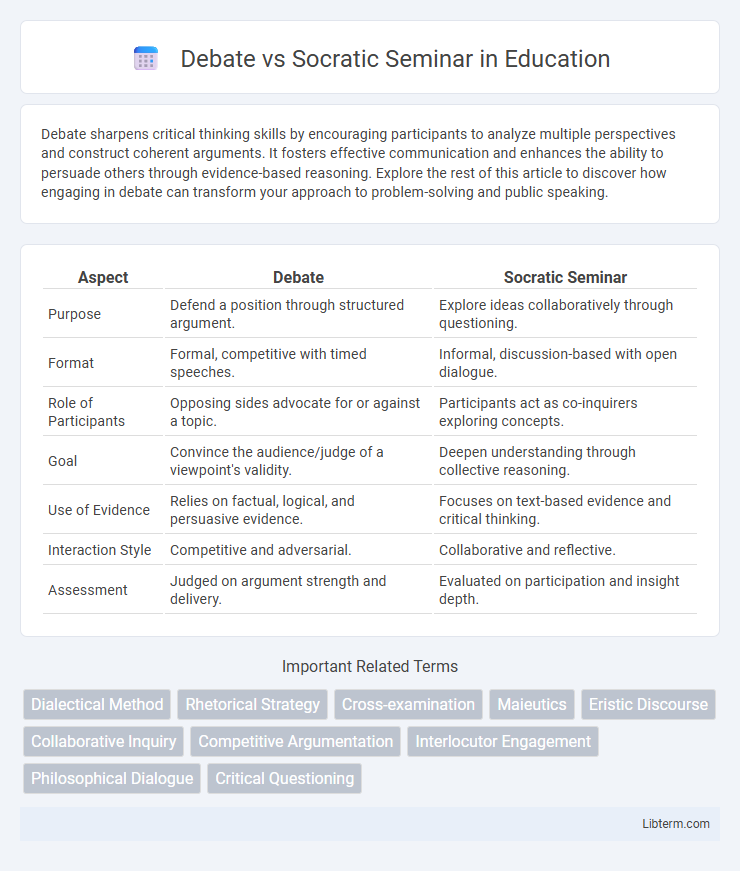Debate sharpens critical thinking skills by encouraging participants to analyze multiple perspectives and construct coherent arguments. It fosters effective communication and enhances the ability to persuade others through evidence-based reasoning. Explore the rest of this article to discover how engaging in debate can transform your approach to problem-solving and public speaking.
Table of Comparison
| Aspect | Debate | Socratic Seminar |
|---|---|---|
| Purpose | Defend a position through structured argument. | Explore ideas collaboratively through questioning. |
| Format | Formal, competitive with timed speeches. | Informal, discussion-based with open dialogue. |
| Role of Participants | Opposing sides advocate for or against a topic. | Participants act as co-inquirers exploring concepts. |
| Goal | Convince the audience/judge of a viewpoint's validity. | Deepen understanding through collective reasoning. |
| Use of Evidence | Relies on factual, logical, and persuasive evidence. | Focuses on text-based evidence and critical thinking. |
| Interaction Style | Competitive and adversarial. | Collaborative and reflective. |
| Assessment | Judged on argument strength and delivery. | Evaluated on participation and insight depth. |
Introduction to Debate and Socratic Seminar
Debate is a structured argumentative format where participants present opposing viewpoints on a specific resolution, emphasizing persuasive rhetoric and evidence to convince judges or audiences. In contrast, a Socratic Seminar fosters collaborative dialogue centered around open-ended questions and critical thinking, encouraging participants to explore complex ideas through rigorous inquiry and reflective listening. Both methods develop communication skills but differ in purpose: debate aims to win an argument, while Socratic Seminars seek deeper understanding through collective reasoning.
Historical Origins and Development
The historical origins of debate trace back to ancient Greece, where formal argumentation was used in political and legal settings, especially in the Athenian democracy. The Socratic Seminar, rooted in the teachings of Socrates around 400 BCE, emphasizes cooperative dialogue and critical questioning to explore ideas deeply rather than winning an argument. Both methods have evolved over centuries, with debate becoming structured competitive formats and Socratic Seminars influencing modern educational practices focused on inquiry and reflection.
Core Objectives and Purposes
Debate centers on advocating for opposing positions to persuade an audience, emphasizing argumentation skills, critical thinking, and quick rebuttals. Socratic Seminar aims to deepen understanding through open-ended questioning and collaborative dialogue, fostering active listening and reflective thinking. Both methods develop communication skills but differ in focus: debate prioritizes winning an argument while Socratic Seminar prioritizes exploring ideas collectively.
Structure and Format Comparison
Debates follow a formal structure with timed speeches, rebuttals, and a clear resolution, emphasizing competitive argumentation between opposing sides. Socratic Seminars adopt an open-ended format where participants engage in collaborative dialogue, using open questions to explore complex ideas without a winner or loser. The debate format prioritizes persuasive tactics and strict turn-taking, while Socratic Seminars focus on critical thinking and collective inquiry through guided discussion.
Rules, Roles, and Participation
Debates require strict adherence to formal rules, including time limits, structured arguments, and opposing teams, with roles clearly defined as proponents and opponents who present and rebut points. In Socratic Seminars, participants assume the role of active listeners and questioners, engaging collaboratively to explore ideas deeply without formal opposition or winners. Participation in debates is competitive and goal-oriented, while Socratic Seminars emphasize inclusive dialogue and critical thinking through open-ended questioning.
Communication and Questioning Techniques
Debate emphasizes assertive communication and structured argumentation where participants present opposing viewpoints to persuade an audience, utilizing clear claims supported by evidence. Socratic Seminar focuses on collaborative dialogue, encouraging open-ended questioning and reflective listening to deepen understanding through continuous inquiry and exploration. Questioning techniques in debates are typically strategic and oppositional, while Socratic Seminars prioritize probing, clarifying, and connecting ideas to foster collective reasoning.
Critical Thinking and Analytical Skills
Debate cultivates critical thinking by requiring participants to formulate persuasive arguments and anticipate opposing viewpoints, enhancing analytical skills through structured reasoning and evidence evaluation. Socratic Seminar promotes deep analytical thinking by encouraging open-ended questioning and collaborative dialogue, allowing participants to explore diverse perspectives and refine their understanding. Both formats strengthen critical thinking and analytical skills but differ in approach: debate emphasizes argumentation and rebuttal, while Socratic Seminar focuses on inquiry and reflective discussion.
Benefits and Limitations of Each Approach
Debate enhances critical thinking and public speaking by encouraging participants to defend positions under time constraints, yet it may promote adversarial dynamics and limit in-depth exploration of complex topics. Socratic seminars foster collaborative dialogue and deeper understanding through open-ended questioning and reflective listening, but they can be time-consuming and depend heavily on participants' willingness to engage thoughtfully. Both methods offer unique educational benefits, with debate emphasizing persuasion and quick reasoning, while Socratic seminars prioritize collective inquiry and nuanced comprehension.
Choosing the Right Method for Learning
Debate emphasizes structured argumentation and persuasive techniques, making it ideal for developing critical thinking and public speaking skills. Socratic seminars foster deep understanding through collaborative inquiry and open-ended questioning, which supports reflective learning and empathy. Selecting the appropriate method depends on whether the goal is to enhance argumentative rigor or to encourage dialogue and comprehensive exploration of complex ideas.
Conclusion: Finding Common Ground
Debate emphasizes winning by presenting opposing arguments, while Socratic seminars focus on collaborative dialogue to explore ideas deeply. In conclusion, finding common ground is more achievable through the Socratic seminar's cooperative questioning and reflection, which encourages understanding multiple perspectives rather than defending a fixed position. This approach fosters mutual respect and shared insights, promoting consensus over competition.
Debate Infographic

 libterm.com
libterm.com